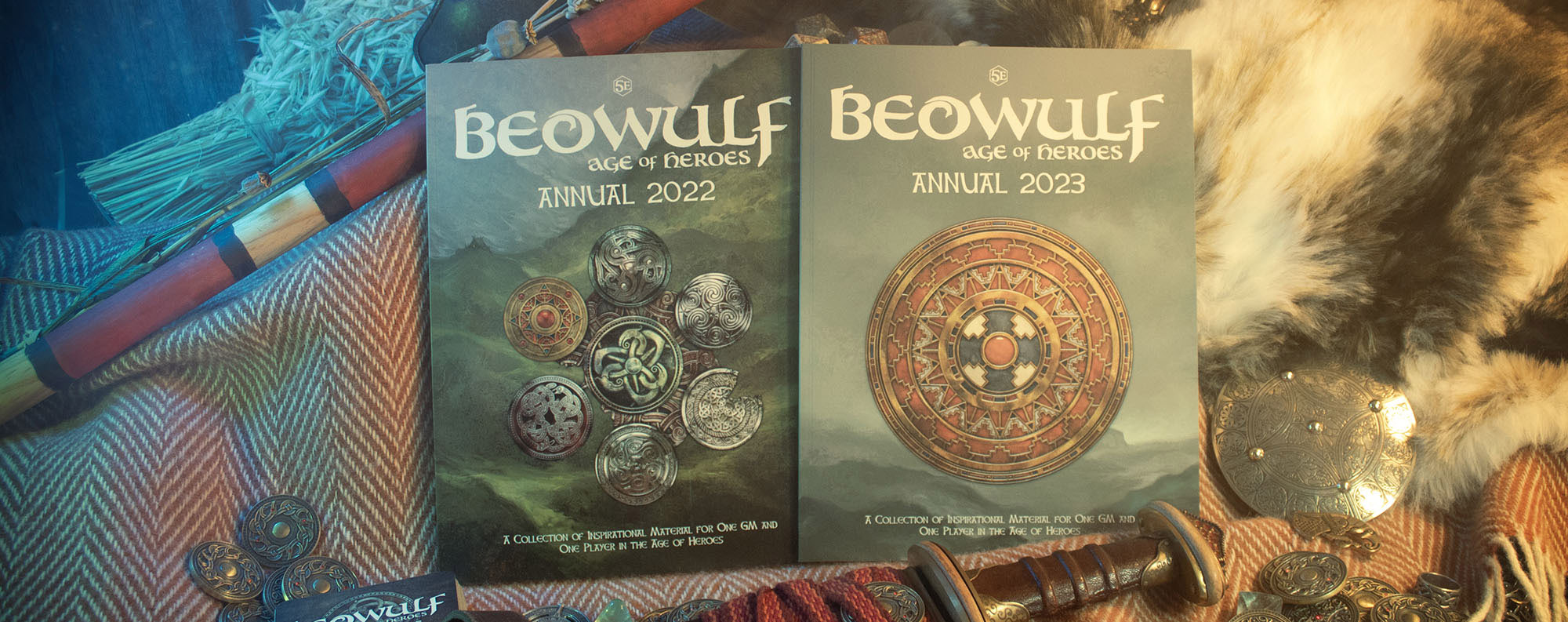KC Shi wrote Ear of Stone, one of the BEOWULF: Age of Heroes adventures featured in Trials of the Twin Seas. We’re going to ask her a few questions about that process.

Handiwork Games (HW): KC, you’ve got a lot of experience in the roleplaying game field. What’s your favourite kind of project to work on?
KC Shi (KC): Thank you! It’s generous to call me experienced. I feel like I have so much to learn, and everyday I discover more games I want to read, play, and study. As for my favourite projects, I get really excited once monsters are involved. From terrifying, stompy monsters to cute, shoulder-sitting monsters, they always provide memorable moments at the table. Writing a bestiary entry is essentially the equivalent of chatting a friend’s ear off about the cool new animal I just read 15 articles about. And on a more serious note, I think monsters reveal a lot about how we relate to the natural world, the kinds of creatures for whom we reserve our sympathy, and the qualities we use to define ourselves as people. Basically, if you add dinosaurs to a project — or anything that vaguely resembles a dinosaur — I’m smitten.
HW: Without spoiling things too much, there are several conflicts between people in your adventure and the monster being in conflict with the Hero is almost a side-effect of some of those conflicts. Can you tell us a little about the decision to centre the story around certain human characters?
KC: It’s a trick I’ve used in the past to build the story’s emotional core. Sometimes, designing a pre-written adventure feels like writing a novel while barely knowing anything about the protagonist. I never want to make assumptions about the player characters or what they’re feeling, so instead I use these central NPCs as a scaffold for the plot. While they let me explore the themes I’m interested in as a writer, more importantly they hold a mirror up to the heroes. I always use them to ask, “What would you do in my position? What part of my dilemma resonates with you?” Then, I let them go. If a GM wants to continue running games in the system, I find a detailed character, who they can involve in future stories, is more useful to them than a detailed plot, which they can only run once.
HW: Towards the beginning of the adventure, there’s a scene where a ‘magic phrase’ might be required from the Hero. Of course we see that in a lot of stories as well. Was there any particular inspiration for this or was just a natural outgrowth of the larger story?
KC: As I was researching Beowulf and the time period it was written, one of the first things that caught my eye was the power of custom and hospitality. From where I’m sitting, here in the modern day, those ideas don’t seem to exert quite as much influence over us as they once did, but I wanted to emphasise the extraordinary importance these concepts held to the peoples of BEOWULF. That’s what spells and magic phrases are, at the end of the day. They take something abstract but powerful, like education or family lineage or personal willpower, and they make the effects more concrete. If that power is something we, in the real world, don’t find natural or obvious, then it helps teach us the priorities of the people in a historical or fantasy setting.

HW: A basking shark features as a character you might meet over the course of the adventure. How did you decide to use this particular creature? Is there any special significance to your choice?
KC: The short answer is I think basking sharks are cool. The long answer is I was doing research on the Baltic Sea and I found a couple sources emphasising the diversity and importance of sharks in those waters. At the same time, I knew I wanted this adventure to feature an animal that most people thought of as aggressive or dangerous, but to present it in a gentler light. The basking shark seemed like the perfect choice — a shark but also a filter feeder, native to the area, whose size and appearance gave it a natural majesty. I imagine the adventure would have a very different tone if it instead starred the infamous Greenland shark, which readers might also know as the “pee shark.” (It’s not actually full of pee, but that’s a story for another time.)
HW: Do you have any advice for a player about to take on this adventure, or for a GM about to run it?
KC: Make fun choices! The structure of the adventure is inherently flexible, plus it has plenty of branching paths to accommodate your decisions. Also, engage with the NPCs. The meat of this adventure lies in the dramas of its cast, so stay curious and take advantage of the conversational nature of roleplay. GMs, on a similar note, do your best to get into the minds of each of the main NPCs. There are tips and advice throughout the adventure, but ultimately you’re going to do your own take on each of these characters, and that’s what makes roleplaying games magical.
Ear of Stone will be one of the adventures features Trials of the Twin Seas, a full-colour hardcover collection of our BEOWULF adventures. Sign up for the forthcoming Kickstarter here!

